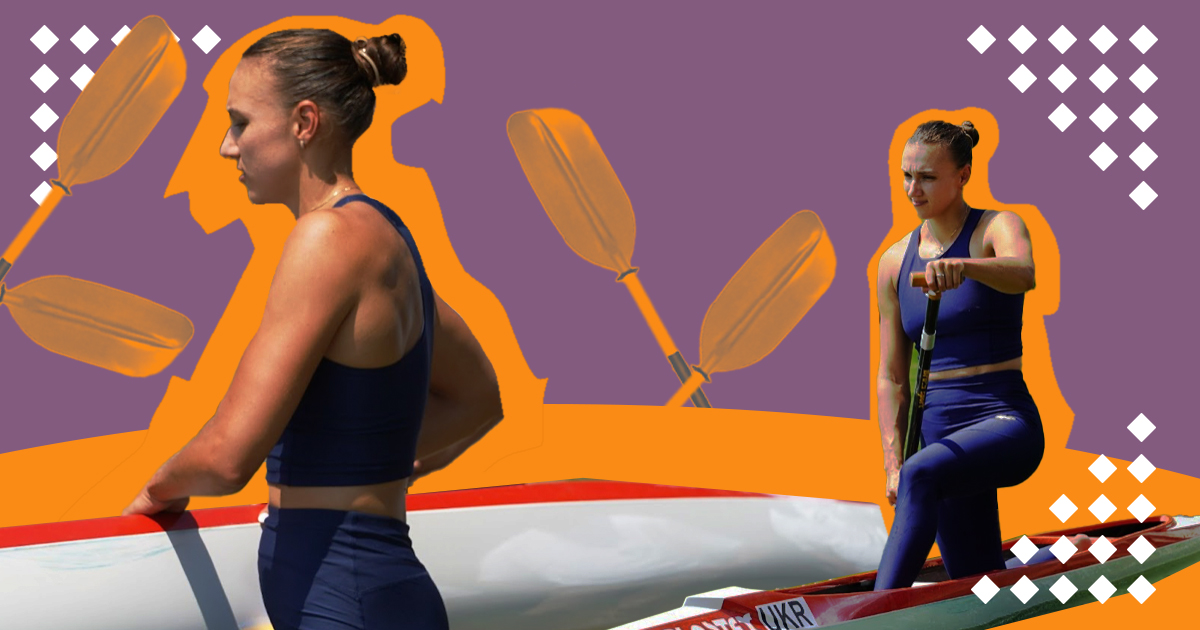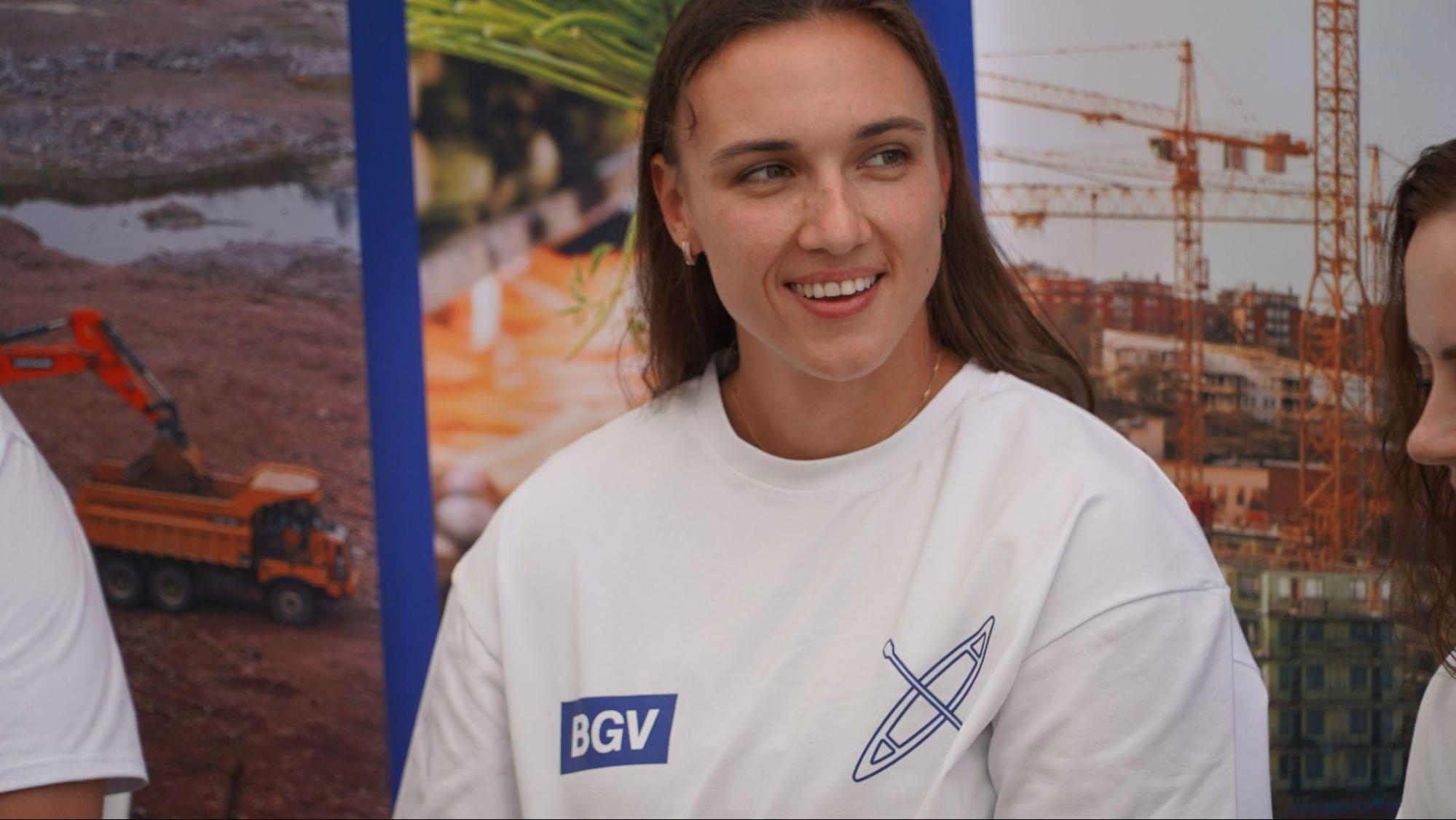Anastasiia Rybachok, the silver medalist of the last Summer Olympics in Tokyo, plans to return home with medals again this year. In April 2023, she gave birth to a child and did not expect to go to the Olympics in Paris. However, a few weeks after giving birth, she returned to training, and three months later, she won the Ukrainian championship. Rubryka spoke to the canoeist about her journey and expectations for the Olympics 2024.


Olympic medalist Anastasiia Rybachok started canoeing thanks to her younger brother. When the twelve-year-old came to cheer for him at the competition, coach Vasyl Tsikhovlis noticed the girl. Through his parents and brother, he persuaded Rybachok to try kayaking. The future Olympic champion agreed but took it as a joke.
"Summer, heat, and water. Like any child, I took the training as an opportunity to swim. But the coach convinced me that this sport is not just entertainment. It can develop into a career, become my life and future," the athlete says.
Later, her brother ultimately left this sport, but Rybachok, on the contrary, found friends and began to participate in competitions. The athlete won her first medal in the first year at the regional competition. She recalls that she began to dream of new achievements and medals.
In the first years, she performed in kayaking. Back then, balance on the water had to be maintained by sitting with a two-sided paddle and buoys on both sides. Later, she decided to switch to canoeing, where you row standing on one knee.


Anastasiia Rybachok.
She also says that along with canoeing, she tried many other sports and was engaged in modeling and dancing. However, nothing stuck. Rybachok graduated from school and university but did not give up canoeing.
"There were many moments that could have put everything on hold or put my sports career on the back burner. However, I decided that canoeing would not be just a hobby, not just some sports interest, but I would really make it my job and my life," says the athlete.
That's how Rybachok began to participate in major competitions. The European and World championships were supposed to be the first, but the athlete could not get there due to an injury. She made her debut already at the European Youth Championship in doubles (canoe for two people) with Lyudmyla Luzan. Then, the canoeists won bronze.
"The first year, the first doubles competition, the first European championship, and already with a medal. It was a total luxury. I realized that my journey can only begin. You don't have to finish in juniors or youth, as others sometimes do," Rybachok recalls.
Then, there was more than one medal at the European and World Championships——bronze, silver, and gold. However, Rybachok's biggest victory came in 2021 during the Olympic Games in Tokyo. Together with Ludmyla Luzan, they took second place and conceded only to Chinese canoeists. By the way, these were the first Olympic Games where women's canoe competitions took place.
"These emotions cannot be compared with anything. When athletes go to the Olympic Games for the first time, they don't expect a medal. But when we took the silver, I realized that this is exactly what our team has worked so hard for for so many years. I cried a lot," says Rybachok.
Like many Ukrainian athletes, Rybachok faced a lack of funding. Due to this, the canoeist could not update sports equipment and ensure the necessary level of training.
Shortly after winning the Olympics, in April 2023, Anastasia gave birth to a son, Nazar. It seemed that the sports career had to be put on hold. But there was almost no break.
Two weeks after giving birth, Rybachok had already started working out in the gym. Another two weeks later, she underwent a routine examination, and it became clear that the athlete had fully recovered. After that, she returned to the water but did not yet know that she would be preparing for the Olympic Games in Paris.
The first task was to win the Championship of Ukraine, which was held in September, 3.5 months after giving birth. The athlete perceived these competitions as an opportunity to understand what she was capable of after having a child. After winning, Rybachok consulted with her husband and coach, and together, they decided that the athlete had every chance to get to Paris. The athlete's husband, Andrii Rybachok, is also engaged in sports — he is an honored master of sports of Ukraine in kayaking and canoeing, as well as a multiple world champion.
When she was already accepted into the 2024 Olympic team, she needed financial support. As her husband was also preparing to qualify for the 2024 Olympic Games, they understood they couldn't adequately provide for the child and pay for the fees with their own money.
Anastasiia and Andrii Rybachok with their son Nazar. Photo from the couple's personal archive
The athlete turned to the president of the Canoe Federation for help, and he promised to help find sponsors for participation in the Olympics. This is how the athlete met Gennadii Butkevych's BGV Group Management investment company team, which responded to her request and acted as the canoeist's general partner at the Summer Olympic Games in Paris.
"At first, I did not understand whether the business would want to support me. Canoeing is not a very popular or mass sport, and I was worried that sponsors would not be interested in it," Rybachok explains. However, it took one day for the BGV investment group to make a decision, and they believed in the cooperation. Rybachok received the best new boat, making it much easier to train. "Since then, I have been able to think only about my results and victories," the athlete says.
The most important support from the partners, the BGV Group Management company, was the purchase of a new canoe and paddles. First of all, the new canoe is more modern and has better characteristics, which directly affects the result of swimming. According to the athlete, the new paddles and boat improved the result by 30%.
This is a single canoe manufactured using modern technologies that fully meet the technical requirements of the International Canoe Federation. This is the same model of canoe that Rybachok has been training with since the beginning of her career with the Ukrainian Olympic team. However, the canoe holds significance beyond its technical characteristics for the athlete—she designed it herself. In the last Olympic Games, her canoe featured a black panther symbolizing speed. Now, it bears the inscription "I AM UKRAINIAN."
"The International Olympic Committee forbids placing any inscriptions related to war on boats. We can't even write 'Stop War.' They consider it propaganda. But the inscription 'I AM UKRAINIAN' indicates our belonging to Ukraine, which is important," explains the athlete.
Rybachok is convinced that sport is not "beyond politics." It is important for her to say that she is a Ukrainian, that there is a war going on in her country, and that Russia is the aggressor country. However, the IOC does not allow this, instead offering Ukrainians the opportunity to compete on neighboring tracks with Russians or Belarusians.
"Now, the homes of our relatives and friends are being destroyed, and here, in the Olympic Village, Russians are listening to Russian music," the athlete continues.
That is why she, together with her trainer, Dmytro Hrynko, is making every effort to show her best in Paris and demonstrate Ukraine's power and strength. Currently, Rybachok trains at the base of the State Enterprise Olympic Educational and Sports Center "Koncha-Zaspa" for 2.5 hours twice a day.
The athlete also recalls how cooperation with the new coach began. Then, she did not fully believe that she would be able to recover and get to the Olympic Games. However, Hrynko was ready to take into account the peculiarities of the postpartum period and was convinced that the athlete would quickly get in the right shape to participate in world-class competitions.
The athlete emphasizes that transitioning to another trainer was extremely important and a turning point — a transition from training to cooperation.
Anastasiia Rybachok and her coach Dmytro Hrynko
There was little time to get along and work together, but Rybachok took a risk.
According to the athlete, quality training is also facilitated by the constant organizational and financial support of the general partner BGV Group Management. The company helped purchase a motor for the boat so the coach could always be nearby during the swims and see how the canoeist works. In addition to the boat and other sports equipment, BGV also paid for the logistical and organizational costs for Rybachok and her team's participation in the Olympics in Paris.
"It is very important. We have been cooperating and friends for not so long, and the company has already made a huge contribution to my sports training. And, of course, my boat is my work, my pride!" emphasizes Rybachok.
On July 31, the athlete left for Paris — the first swims will begin on August 6. The athlete shares she is worried and feels a great responsibility, but she promises to do everything possible to return with a victory.
Thirty-nine years ago, the Chornobyl nuclear disaster forced the resettlement of residents from areas contaminated… Читати більше
Recovery Camp is a psychosocial rehabilitation project for Ukrainian children that has been running for… Читати більше
Екологічна освіта, громадянська наука та цікава практика — складники ініціативи, яку втілили для молоді Краснокутської… Читати більше
A team of researchers has trained an AI model to see not just rubble in… Читати більше
У лікарнях Харкова та Ужгорода студенти під наставництвом психологинь, менторів та супервізора проводять для дітей… Читати більше
У Лубнах фахівці, які допомагають військовим, вчилися будувати довірливий контакт із тваринами, зокрема кіньми та… Читати більше
Цей сайт використовує Cookies.